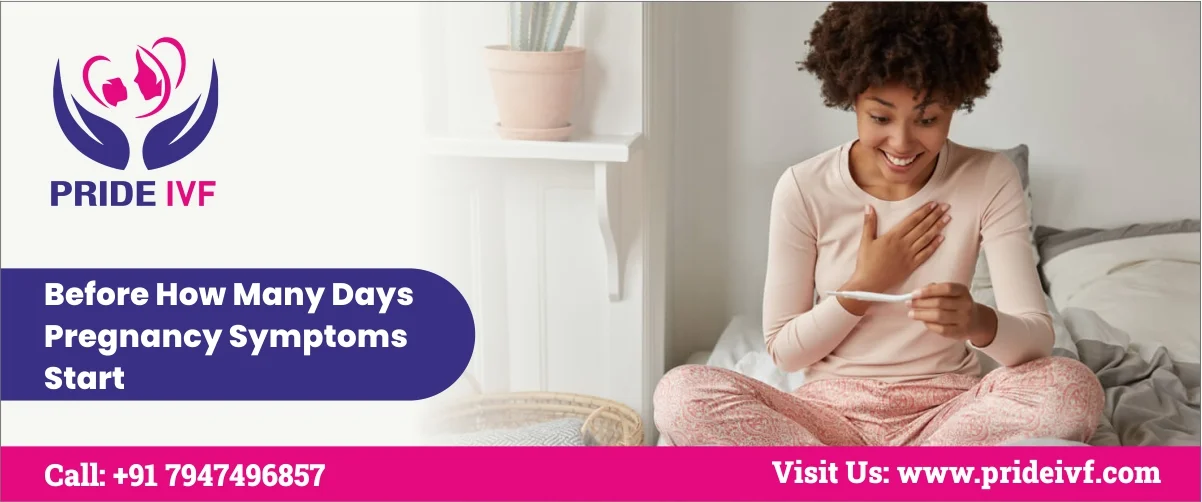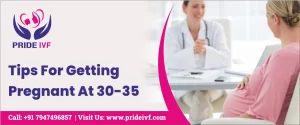Before How Many Days Pregnancy Symptoms Start: It’s possible that you’re anxiously awaiting the first pregnancy symptoms if you’re trying to get pregnant. However, what is the estimated time frame for observing any signs? In this section, we will discuss the timetable and possible experiences in the days preceding a missed period.




Understanding the timeline
- Ovulation: Around 14 days before your next anticipated menstruation, ovulation usually takes place. This is when an egg can be fertilized by sperm if your cycle is regular. The average time following ovulation for fertilization is 24 hours.
- Implantation: Usually 6 to 10 days after ovulation, the fertilized embryo implants in the uterus after passing via the fallopian tube. as the body’s production of pregnancy hormones is initiated by the implantation procedure. (Read: After Embryo Transfer Day By Day Symptoms)
- Hormone production: Human chorionic gonadotropin, or hCG, is the hormone that most pregnancy tests detect and is produced by the body after implantation. Numerous signs of early pregnancy are caused by this hormone. usually implants six to ten days after ovulation, passing via the fallopian tube and into the uterus. because the body produces pregnancy hormones in response to the implantation procedure.
Before How Many Days Pregnancy Symptoms Start:
After implantation, most women begin to experience early pregnancy symptoms a few days to a week later. These are some typical symptoms along with possible times for them to appear:
Missed Period: If the egg has been fertilized, this is typically the first indication that many women detect. It normally happens 14 days following ovulation.
Breast Changes: Increased sensitivity, pain, or swelling can develop as early as one to two weeks following pregnancy due to hormonal changes.
Tired & Fatigue: Soon after conception, generally within a week or two, a lot of women report feeling abnormally weary as hormone levels rise and the body starts to work harder to sustain a pregnancy.
Nausea: Usually starting around week six of pregnancy, morning sickness can strike some women as soon as two or three weeks after conception.
Frequent Urination: This symptom, which is brought on by hormonal changes and increased blood flow to the kidneys, may begin around the time you miss your period.
Mood Swings: Mood swings can result from hormone fluctuations as early as one or two weeks after pregnancy.
Spotting and Cramping: About 6 to 12 days after ovulation, some women suffer implantation cramps or mild spotting, which can be mistaken for an early period.
Modifications in Appetite: Soon after conception, some women report experiencing changes in appetite, desires, or aversions to particular foods. As early as the first few weeks of pregnancy, this can happen. For example, you may find yourself yearning for things you usually don’t like to eat or becoming sick to your stomach from odors you used to tolerate.
Enhanced Perception of smell: One frequent early pregnancy symptom that might appear a few weeks after conception is increased sensitivity to scents. Many women say that during this period, some smells—like food or perfumes—can become overpowering.
Headache: Hormonal fluctuations might cause headaches in some pregnant women. Even though headaches are typical occasionally, those that are severe or chronic should be handled with a healthcare professional.
Role of Early Symptoms on Emotions
Anxiety and excitement can coexist in the early stages of pregnancy. When you’re actively trying to get pregnant, you could find yourself overanalyzing every physical ache or sensation, attempting to figure out if it means you’re pregnant. This emotional rollercoaster may be quite severe, particularly if you’ve gone through periods of optimism and disappointment in the past.
Some Advice on Controlling Your Emotions While You Wait
- Remain Up to Date: You might feel more prepared if you are aware of the early pregnancy symptoms and indicators. In this uncertain time, knowing may be consoling.
- Seek Support: Don’t be afraid to reach out to loved ones, friends, or support organizations. Emotional burdens might be lessened in part by talking about your feelings.
- Exercise self-care by finding ways to de-stress and look after your mental health. This might be anything from doing yoga and meditation to curling up with a nice book or movie.
- Limit Your Online Research: Although it may be fascinating to look up every symptom online, doing so might cause unneeded worry. Rely on trustworthy sources, and if social media overwhelms you, take vacations from it.
- Concentrate on the Positive: Rather of obsessing on what could or might not occur, try to focus on the possibilities. Relieving worry in the present time might be beneficial.hormonal changes resulting in pregnancy. Even though headaches are typical occasionally, those that are severe or chronic should be handled with a healthcare
The majority of at-home pregnancy tests are made to measure hCG levels in urine, and they work best when used just after a missed period. Some tests, nevertheless, assert that they may identify pregnancy as early as a few days before your scheduled menstruation. It is preferable to wait until at least the day after your missing period for the most accurate results.
Early pregnancy symptoms might appear anywhere from a week or so before your expected period to a few days after conception. But each woman’s body is unique, and there can be a wide range of symptoms. When is the ideal time to take a pregnancy test if you think you might be pregnant? You can find out by monitoring any changes in your cycle. Recall to seek individualized guidance from a healthcare practitioner
In order to have a safe pregnancy, you must see your doctor as soon as you start detecting early pregnancy symptoms. Do not be afraid to seek professional assistance if you have any troubling symptoms, a positive test result, or a missing period. Both your health and your unborn child’s health can be significantly improved by receiving early prenatal care.
Lets get started
Please get in touch if you have any queries or would want to share your experiences! You don’t have to go it alone; your trip is significant.trip is significant, and you’re not going through it alone.
We at Pride IVF Centre in Delhi believe that every individual should have the opportunity to have a family. We are thrilled to provide new patients with a unique promotion to help them on their journey. Our staff is here to support you at every stage of the process, whether you’re thinking about doing your first IVF cycle or want to go forward.
Our highly skilled fertility specialists are committed to you individualized care that is catered to your particular need. Our empathetic attitude and years of expertise allow us to support you throughout your reproductive journey.
Our comprehensive variety of treatments, which includes sophisticated reproductive technologies like IVF, ICSI, and genetic testing, is intended to optimize your chances of success, starting from first consultations.
Our clinic offers the newest technology and a comfortable environment to make sure you get the best service possible.
We recognize that undergoing reproductive treatments might provide emotional difficulties. Our committed counselors are here to offer you the assistance you require along every step of the way.
Conclusion:
To summarize, the onset of early pregnancy symptoms might occur several days post-conception or around a week prior to the scheduled menstrual cycle. While some women could detect symptoms right away, others might wait till after missing their period to notice anything at all.
Keep in mind that each woman’s body is different and that symptoms might differ greatly. When is the ideal time to take a pregnancy test if you think you might be pregnant? You can find out by monitoring any changes in your cycle. Throughout your road to parenting, always seek the counsel and assistance of a healthcare expert.
Please feel free to reach us if you have any queries or would want to share your experiences! You are not alone in this process, and your journey is significant.
FAQ
Q) When do early pregnancy symptoms typically start?
As soon as a few days after conception, or around the time of a missing menstruation, which usually occurs two weeks following ovulation, early pregnancy symptoms might appear.
Q) How can I tell if my symptoms are related to pregnancy?
Premenstrual symptoms can sometimes mimic early pregnancy symptoms, but a missing period in addition to other symptoms like nausea or breast tenderness might be a sign of pregnancy. Utilizing a pregnancy test at home is the most dependable method of confirmation.
Q) Are cramps common during the very first week of pregnancy?
Yes, because of implantation and the body reacting to hormonal changes, slight cramps may be common in the early stages of pregnancy. Severe discomfort or cramping, however, has to be discussed with a medical professional.
Q) When is an appropriate time to get a pregnancy test?
When used after a missed period, the majority of home pregnancy tests yield the best results. Wait until at least the day of your missing period for the most reliable result. Certain tests can identify pregnancy up to a few days before your expected period.




